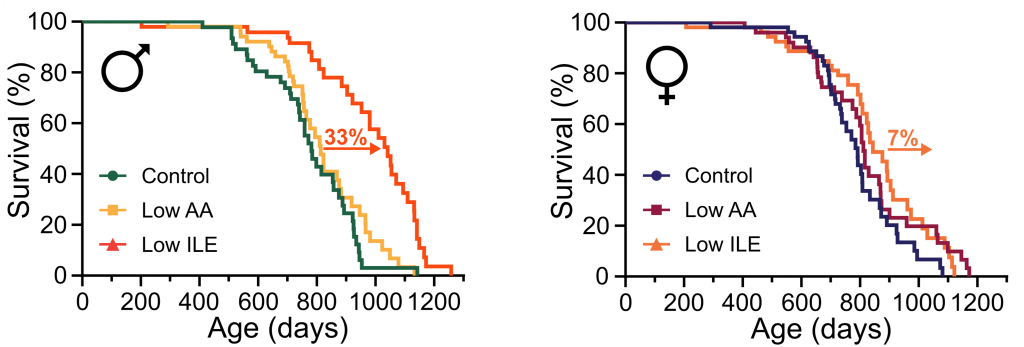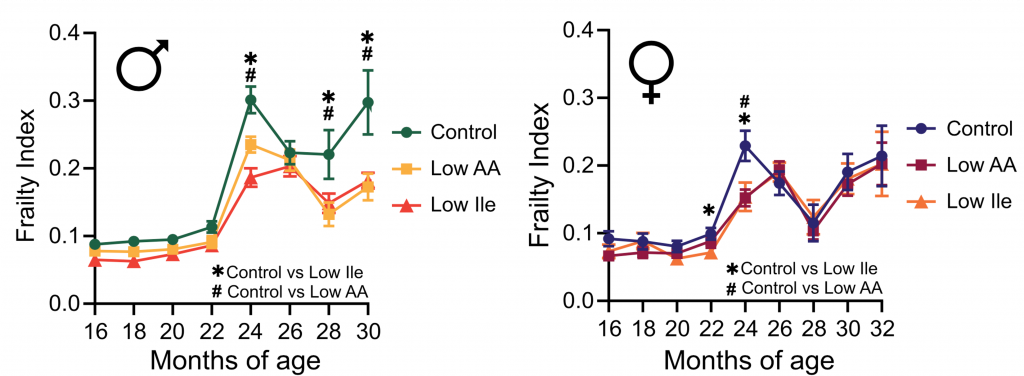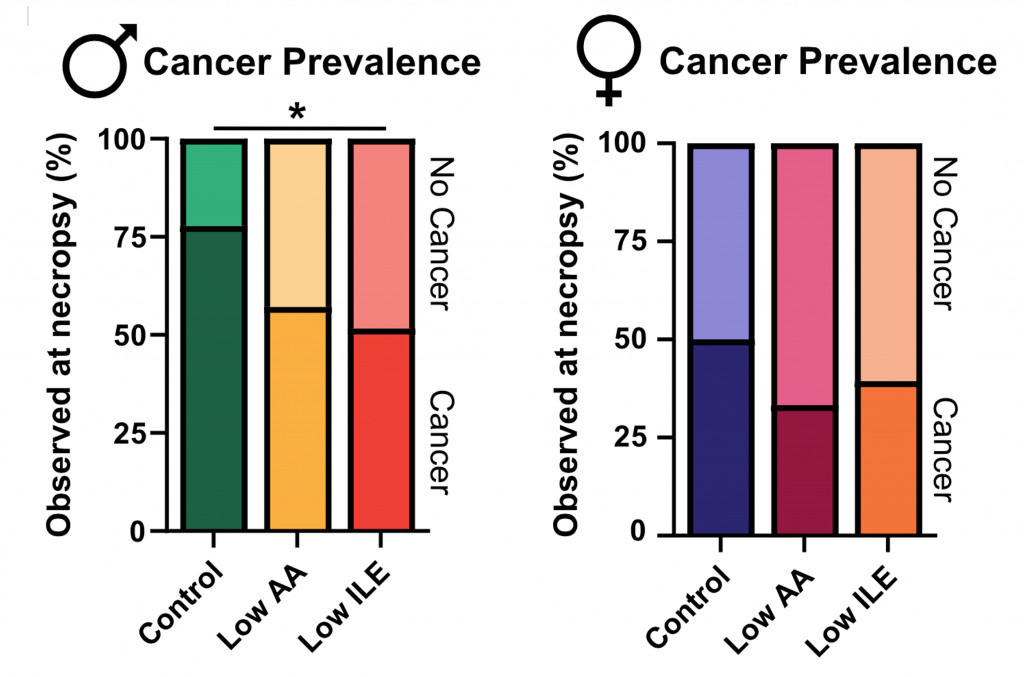Key Points:
- A diet low in isoleucine prolongs the lifespan of male mice by 33% and female mice by 7%.
- Low isoleucine alleviates age-related frailty and poor health in mice.
- Limiting isoleucine intake reduces cancer prevalence in male, but not female mice.
Since finding that caloric restriction (CR) — eating fewer calories — extends the lifespan of animals, scientists have searched for interventions that mimic CR. This is because, in countries like the USA, widespread availability and affordability of calorie-dense foods often challenge people to regulate their consumption of tempting calories throughout the day.
Now, researchers from the University of Wisconsin-Madison and the University of California Irvine have found that avoiding isoleucine may mimic CR. As reported in Cell Metabolism, Green and colleagues show that dietary restriction of isoleucine increases the lifespan of mice. Furthermore, they show that low isoleucine intake reduces frailty and cancer prevalence.
Harvard’s aging science researcher David Sinclair has tweeted on the subject:
“Isoleucine is an essential amino acid which, in excess, counters the health benefits of the mTOR[C1] longevity pathway. The @LammingLabis reporting that an isoleucine-restricted diet extends the lifespan of mice by 33% 👏”
However, the authors note:
“In combination with the fact that isoleucine is not a strong mTORC1 agonist, this suggests that isoleucine restriction may work through largely mTORC1-independent mechanisms.”

A Low Isoleucine Diet Extends Lifespan and Improves Health
In humans, low protein consumption is associated with a decreased risk of age-related diseases and mortality. Furthermore, clinical trials with healthy adults or patients with metabolic syndrome show that low-protein diets improve metabolic health and reduce fat. However, it is unclear which of the 20 amino acids (AAs) — the constituents of proteins — are responsible for these potential longevity benefits.
To examine the AA isoleucine, Green and colleagues fed three groups of 6-month-old mice (equivalent to ~31 human years) three separate diets. The 1) Control group was fed a diet containing all 20 AAs, while the 2) Low AA group was fed a low amount of these 20 AAs, and the 3) Low Ile group was fed a low amount of isoleucine.
In the end, Low Ile group male mice lived 33% longer than male Control group mice. Additionally, Low Ile group female mice lived 7% longer than Control group female mice, indicating sex differences. Furthermore, Low AA group mice did not live longer than Control group mice, suggesting that reducing isoleucine consumption, but not protein in general, can prolong lifespan.

The frailty index (FI) is a routine health assessment able to strongly predict mortality and disability in humans. Green and colleagues determined the FI of mice by measuring several parameters, including hair loss, hunched posture, and grip strength. Since each deficit increases the FI score, a low FI indicates fewer age-related health deficits.
It was found that both Low AA and Low Ile group mice had lower FI scores than Control group mice at various ages. Additionally, female 22-month-old (equivalent to ~65 human years) mice from the Low Ile group had lower FI scores than Control group mice. These findings suggest that consuming less protein or isoleucine can mitigate age-related deficits. However, while a low AA diet leads to reduced frailty, it does not appear to contribute to increased lifespan.

The mice used in this study (HET3) were genetically diverse, better recapitulating human genetic diversity. However, these mice are also more susceptible to cancer. Therefore, Green and colleagues examined the bodies of the mice for tumors upon death. It was found that 75% of male mice from the Control group had cancer, while only about 50% from the Low Ile did.
In female mice, there was not a significant reduction in cancer prevalence in the Low Ile group compared to the Control group. Notably, compared to male mice, female mice had lower cancer prevalence in all three groups. These findings suggest that limiting isoleucine consumption can lower cancer incidence for males, but not females.

Is Avoiding the Consumption of Isoleucine Feasible for Humans?
Isoleucine is one of nine essential amino acids, meaning it is required for survival. Moreover, amino acids do not naturally occur in isolation, so most foods containing protein will also contain isoleucine. So, while limiting isoleucine consumption may be beneficial for longevity, it is also difficult to avoid. The authors say,
“In the context of a human diet, this may limit the translation of our findings, as the simplest way to lower dietary isoleucine at the present time is to reduce total protein intake.”
Indeed, foods highest in isoleucine include beef, chicken, tuna, and pork, which contain high-quality protein and an abundance of other essential nutrients. The authors conclude by saying,
“While short-term isoleucine restriction in humans is likely feasible based on recent studies, long-term isoleucine restriction will likely require novel approaches or the development of pharmaceutical methods to reduce isoleucine uptake or sensing, or the identification of compounds that can mimic the benefits of isoleucine restriction.”
Still, since isoleucine is one of the three branched-chain amino acids (BCAAs), avoiding BCAA supplements that contain no other beneficial nutrients may be feasible. And as always, dietary changes should only be made under medical supervision.